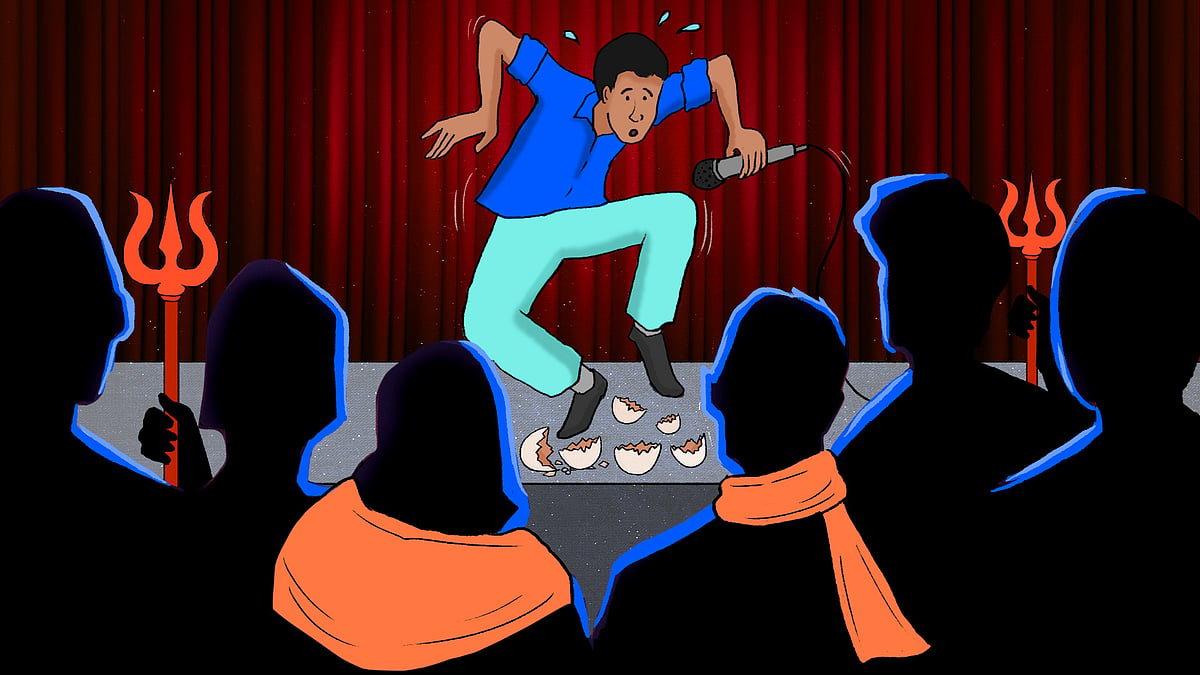
There’s a comedy venue in Mumbai called The Habitat. But its true identity lies in its logo – an unnaturally tall and innocent-looking H. This H has the kind of polarised energy usually reserved for other combinations of letters, such as an R and an S and then another S.
Because in the digital world, when a stand-up comedy clip goes viral with that glowing H in the background, you know something’s about to go wrong. Because it did recently, when a group of men walked into The Habitat and vandalised it.
These men were from the faction that insists they’re the real Shiv Sena, the spiritual heirs to a very specific kind of chaos. They dismantled the place with the sincerity of Versova strugglers who’ve just been told by a casting director that if they want this role, “act like you’re deeply offended and break everything in the room.” And break everything they did.
In a way, confusion has lingered ever since Eknath Shinde split the Sena like a perfectly symmetrical vadapav. But this recent episode – where men channeled their political outrage into breaking bar stools and light fixtures – may have unintentionally settled the debate. This wasn’t just vandalism, this was lineage performance. This was vintage, pristine, pre-liberal approved Shiv Sena in action.
At the centre of this is a spiritual comedian named Kunal Kamra, a man who listens to Osho not for peace but for clarity before chaos. He’s not like Ranveer Allahabadia where good vibes are sacred. He’s not like Samay Raina who accidentally stumbles into public outrage. Kamra marches in with purpose, a man who deliberately drives a truck into a building – not out of rage but curiosity, just to study the expressions on everyone’s faces.
The trigger was a YouTube special in which Kamra spared no one. Not Eknath, not Ambani, not Bhavish Aggarwal, not even Anand Mahindra. He named names, cracked jokes, and sang parody songs, some of which even rhymed.
In normal times, these jokes would have passed as normal. But we don’t live in normal times. We live in a place where power is so fragile it bruises at the sound of a mic check. Kamra did the reckless thing of asserting free speech in a society where even silence is cross-examined. Free speech, ironically labelled ‘free’, is among the most expensive things in India. Like every product stamped with ‘free’, it comes with hidden costs – and the GST on this one is usually the rage of a mob that goes wherever its hormones take it.
You may wonder how we ended up as a mass zoo of perpetually offended people. And whether India’s dismal spot on the new global happiness ranking has anything to do with it. Maybe it does. Maybe it doesn’t.
In normal times, these jokes would have passed as normal. But we don’t live in normal times. We live in a place where power is so fragile it bruises at the sound of a mic check. Kamra did the reckless thing of asserting free speech in a society where even silence is cross-examined. Free speech, ironically labelled ‘free’, is among the most expensive things in India.
The thing with offence is that it isn’t a bad thing in and of itself. It’s a natural emotion and, like most emotions, it comes in different shades. I’m often offended myself – by comedians, influencers, the general cultural smog we all breathe. Sometimes offence sparks debate, nudges clarity, even leads to some healthy deconstruction.
The problem now is that it rarely does any of that. It jumps straight to destruction; sometimes with a broken nose, sometimes with a breakdown. And in the end, it’s the therapists who walk away with the punchline and the invoice.
But there is another form of offence where you aren’t offended but someone tells you that you should be. It could be through the cultural wave, through trends, sometimes through political compulsions. The chaos of confusion can be seen in many places; in one clip, a group burned an effigy of Kamra where he looked somewhat like Steve Jobs and they chanted his name as Kunal Kalra.
A classic example of this theatre of offence is the now-viral phone call where a Shiv Sena worker, dutifully performing the curse of being offended, threatened to beat up Kamra, wherever he may be. The tone was of a confused man, either angry or just tired, like someone buffering through his own outrage and hoping the emotion loads before the call drops again.
Aise Situation me bhi Comedy...
— Mohammed Zubair (@zoo_bear) March 24, 2025
Kunal Kamra : Aaja Tamil Nadu, Mai yahi milunga...
Sena : Kidhar aane ka?
Kunal : Tamil Nadu Aaja..
Shinde Sena : Abhi Tamil Nadu Kaise Pahunchega bhai..
Media says Kunal is Absconding. If @kunalkamra88 is absconding, Why will he receive the… pic.twitter.com/w3aFjZE5IU
It quickly descended into absurdist comedy when Kamra calmly said, “Come to Tamil Nadu”, since that’s where he was.
There was a long pause. The Sena worker, perhaps exhausted by the performance of outrage, sounded less like a crusader and more like a man standing in queue, being bounced between government departments just to renew his driver’s licence. He finally muttered, in a tone that belongs to a Kafka short story, “Abhi Tamil Nadu kaise pahuchega main?”
See, this ritual of offence is now a societal trap. People often don’t even know why they’re offended but it’s the one emotion they’re fluent in. It gives them a flicker or relevance, a false sense of control in a discourse where they otherwise have none. Especially in the current political setup, offence is also a performance for those in power. It’s a signal, a way of saying, “Look, I’m loyal, I’m useful.”
In that sense, offence is also a form of job application, a desperate attempt to climb the social engine.
But then, why shouldn’t offence be aspirational? We live in a society where being offended isn’t just tolerated – it’s institutional. It’s practically the scaffolding of our public life. Over the years in this republic, we’ve seen outrage erupt over paintings, films, celebrity statements, and tweets. Every sphere of life has been fair game for a righteous mob.
This is why the whole idea of free speech in India feels so curious; people are often surprised to discover it doesn’t really exist. But if you understand Indian society, you’ll see it’s designed with an authoritarian sensibility. Here, conformity and meek surrender to authority are mistaken for discipline. In this culture of obedience, one must always bow to power, not question it.
This is a society where the average citizen passes through multiple training grounds for the normalisation of authoritarianism. It begins early in schools, where speech is throttled under the banner of discipline. It continues in colleges, especially engineering ones, which often function like soft police states. And it thrives in families, where the freedom to speak or act arrives gift-wrapped in guilt, control and the quiet violence of emotional blackmail.
René Descartes once said, “I think, therefore I am.” In India, it’s more like: “I think, therefore...I was.”
If you understand Indian society, you’ll see it’s designed with an authoritarian sensibility. Here, conformity and meek surrender to authority are mistaken for discipline. In this culture of obedience, one must always bow to power, not question it.
This is why, at a societal level, the breaking of a venue – or a mob doing what it does – is not seen as a crime but as a necessary correction. A lesson. So when someone says something, and something around them gets broken, it doesn’t really rattle the masses. Because somewhere, deep down, many believe in the usefulness of punishment. They believe in regulation. They believe people must be taught their place. And the politicians, of course, know this better than anyone.
This isn’t the United States, where the First Amendment is treated like sacred text. We prefer the other kind of amendment, where people are expected to amend their words to suit the ever-expanding Republic of the Offended.
And hence, The Habitat comedy club is now broken and may get into construction once again. Perhaps this is what the real meaning of constructive criticism is – where a club goes into construction after every criticism.
As the world outrages, you need news you can trust. Click here to subscribe to Newslaundry. And click here to support our latest Sena project that tracks police impunity across India.
Newslaundry is a reader-supported, ad-free, independent news outlet based out of New Delhi. Support their journalism, here.







